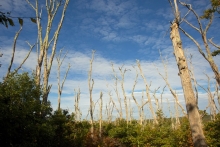You are here
Study: U.S. Must Step Up Forest Pest Prevention

Imported forest pests cause more than $2 billion in damage each year and can be found in all 50 U.S. states. Efforts to prevent new pests must be strengthened if we are to slow the loss of our nation’s trees, says a new study co-authored by Harvard Forest scientists David Orwig and David Foster. The study was led by the Cary Institute of Ecosystem Studies and coordinated by the Science Policy Exchange, a research consortium based at the Harvard Forest and led by Kathy Fallon Lambert and Marissa Weiss.
The study, published today in Ecological Applications, was conducted by a team of 16 scientists - from Harvard Forest, the USDA Forest Service, The Nature Conservancy, Dartmouth College, McGill University, and Michigan State University. It is the most comprehensive synthesis to date on forest pests. It covers both ecological and economic impacts and evaluates a range of policy solutions.
According to the study, 57 imported forest pests live in Massachusetts today. Our region is particularly susceptible to new pests because our forests contain many trees that are closely related to trees in Europe and Asia.
Today, sixty-three percent of U.S. forestland, or 825 million acres, are at risk of increased damage from pests that have already established here. 70% of those forest pests arrived on imported plants. An average of 2 to 3 new pests arrive each year.
Current efforts to prevent new pests are not keeping pace with escalating trade. However, the study reports that current trade policies are projected to return $11 billion in net benefits by 2050. The authors project larger benefits with stronger pest prevention efforts.
- Read stories in The Washington Post, The Boston Globe, The Harvard Gazette, The Atlantic's CityLab, local NPR (MA/NY, PA, CO), and Popular Science.
- Explore the full scientific paper in Ecological Applications: Non-Native Forest Insects and Pathogens in the US: Impacts and Policy Options
- Browse the press release and related video.
- Learn more about the Science Policy Exchange.
- Read more about invasive species research at Harvard Forest.
(Photo of dead oaks on Martha's Vineyard, due to invasive winter moth caterpillars, by David Foster.)

